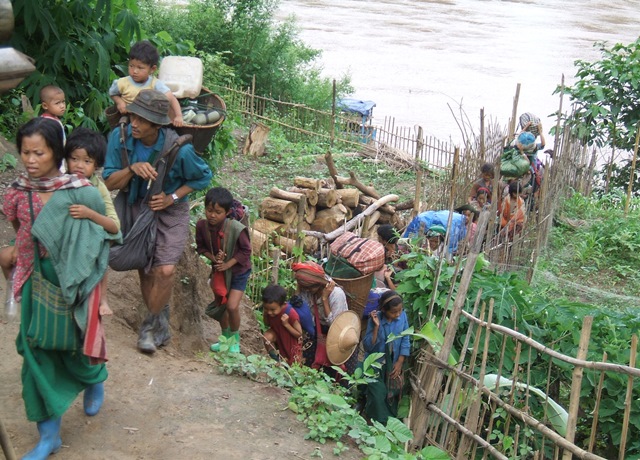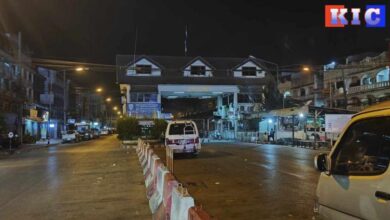Human Rights Group Lists Burma’s Treatment of Minorities Worst In Asia

Burma is arguably the worst offender of minority rights in Asia, according to the latest report by Minority Rights Group International (MRG).
The Minority Rights Group annual report documented “disturbing levels of violence and propaganda against minorities” across Asia but singled out Burma as perhaps the worst place for minority groups where hate crimes were a “daily reality.”
MRG noted that although a “slow process” of reform had taken hold in Burma and opened up “some degree” of free expression, the situation for minorities was arguably most acute of all countries in Asia.
MRG placed Burma as 8th worst in the world in its ‘peoples under threat’ index, putting Burma just behind Pakistan (7th), Iraq (6th) and Afghanistan (5th). It was the only country in Asia to make the top ten worst offenders.
Hanna Hindstrom, Minority Rights Group’s Asia Information Officer said that in spite of “some progress” following the 2011 installment of a nominally civilian government, Burma’s record on human rights continued to be “appalling.”
“Despite making some progress on ceasefire negotiations with armed ethnic groups, the military continues to abuse the rights of minorities throughout the country. Violence still flares in Kachin and Shan states, while reports suggest that forced labour and land grabs have flourished in Karen state.”
MRG is a human rights organisation focusing on securing the rights of minorities, and works in more than 50 countries.
Ms Hindstrom in an interview with Karen News said.
“Perhaps most disturbingly, the country has witnessed a surge in anti-Muslim violence, which has already claimed hundreds of lives, mostly among the stateless Rohingya. But the government has persistently refused to investigate allegations of state involvement in anti-Muslim violence, while defending the proponents of hate speech.”
Ms Hindstrom claimed that President Thein Sein’s government was turning a blind eye to ongoing violence against ethnic minorities, pointing out the persecution of Muslims in Mandalay – Burma’s second largest city – last week as one recent example.
“The government has failed to stop the incitement of hatred towards minority groups, resulting in numerous outburst of violence. Last week’s clashes in Mandalay appear to have been instigated by radical monks with ties to the local authorities. There are many other credible allegations of state involvement in the persecution of Muslims… President Thein Sein has defended the hate preacher Wirathu as a ‘son of Buddha’ and attempted to deport the entire Rohingya population from Burma,” Ms Hindstrom said, adding, “At the very best, the government has turned a blind eye to religiously motivated violence.”
Naw K’nyaw Paw, Secretary of the Karen Women’s Organisation (KWO) said that the attacks against Rohingya were just the latest chapter in the story of government persecution against ethnic minority groups, which goes back decades.
“Despites some efforts at ceasefires by the current administration, serious human rights abuses of ethnic minorities continue and the perpetrators go unpunished. The most brutal issue currently is Burmese government is denying Muslims minority, the Rohingya, basic human rights. The government is allowing the attack against Rohingya to take place and many believe the government is backing those doing the attack. At a minimum nothing is being done to stop them… The use of rape against the ethnic women by Burmese Army also continues with impunity.”
The KWO is a community-based-organisation of Karen women working in providing relief services in the refugee camps on the Thai border and to internally displaced people inside Burma, it has a membership of more than 49,000 Karen women.
Naw K’nyaw Paw said that minorities faced persecution from authorities regularly in Burma.
“The Burma Army is still above the law and they still attack civilians. We have seen the continued use of rape as a weapon of war, increased land grabbing at the expense of ethnic villagers, continued arbitrary taxation by the Tatmadaw and Boarder Guard Forces.
Naw K’nyaw Paw referred to a 2014 report by the Women’s League of Burma that documents more than 100 cases of rape perpetrated by the Burma Army since 2011.
“All of the victims are from ethnic minority women. The use of rape as a weapon of war against ethnic people has been going for many decades and continues today. This is clearly targeting ethnic people and ethnic women in particular. Women are abused by the Tatmadaw (military) daily, while the international community turns a blind eye,” she said.
Naw K’nyaw Paw called for an end to the abuse in Burma and impunity. “We need real action to hold those responsible to account and to change the culture and rules within the military that encourage the abuse,” she said, claiming that in her home Karen State, civilians still suffered.
“In Karen State, there are more than 300 Burmese Army posts and not a single one has withdrawn despite repeated requested by the KNU. These troops are responsible for daily abuse of citizens, creating instability and fear among ethnic people.”
A May 2014 report by the Karen Human Rights Group stated that in spite of the signing of a January 2012 ceasefire between Burma’s government and the Karen National Union, human rights abuses continued to occur including, forced labour, land confiscation, sexual violence and killings.
“Since the ceasefire, villagers have begun to report increasingly about land confiscation for mining, logging, dams, infrastructure development and commercial agriculture. Land is confiscated by armed actors or the [Burma] government in collaboration with companies for those projects.” KHRG said.
KHRG stated in its report that civilians had been displaced by land theft.
“Because of land confiscation, tens of thousands of villagers have been displaced [Including Toh Boh Dam in Toungoo District] and communities face increasing water contamination and damage to land because of development projects.”




